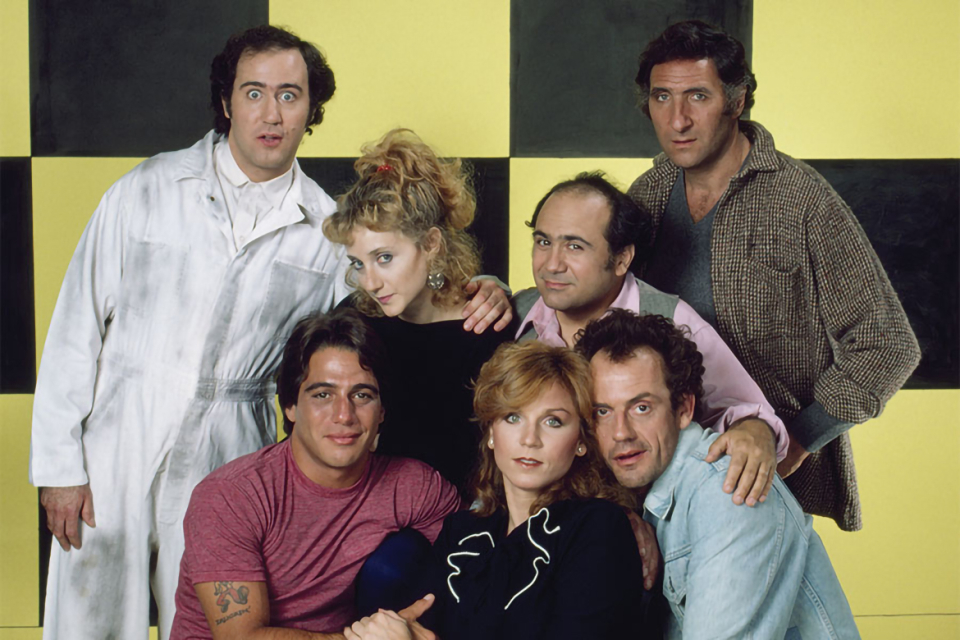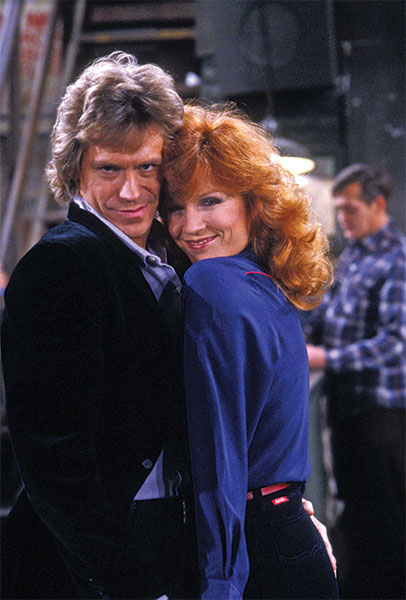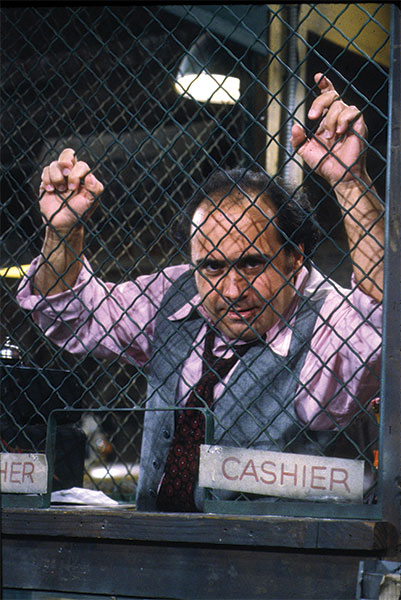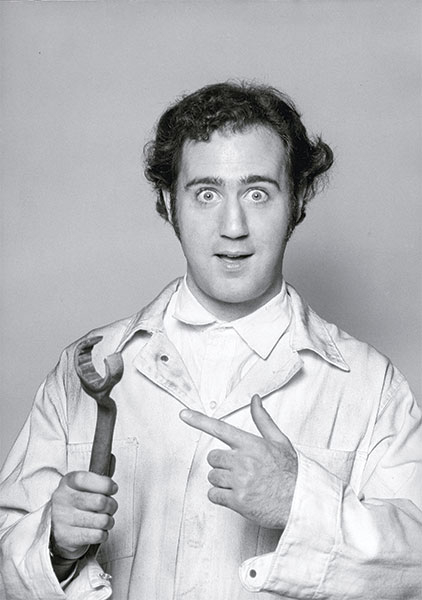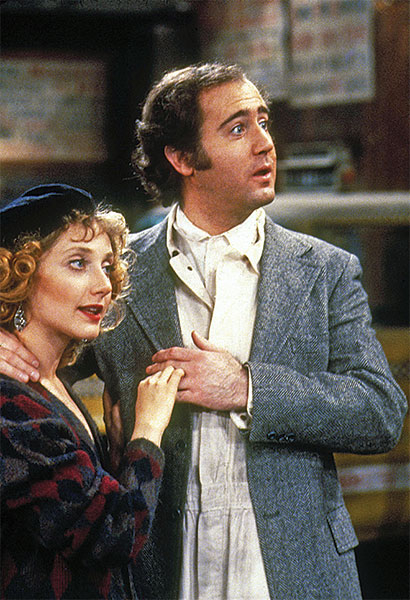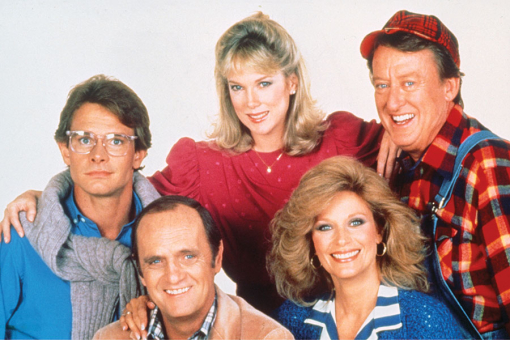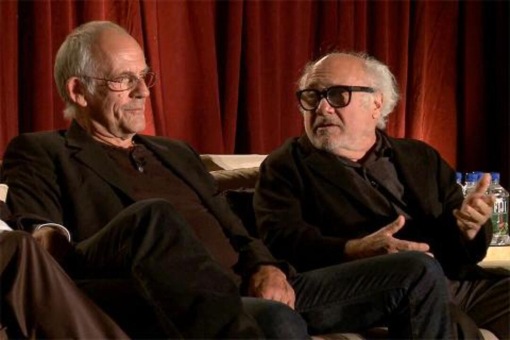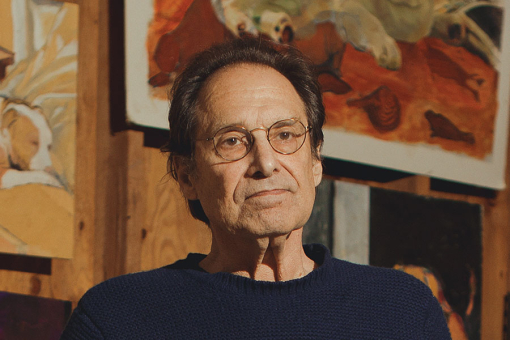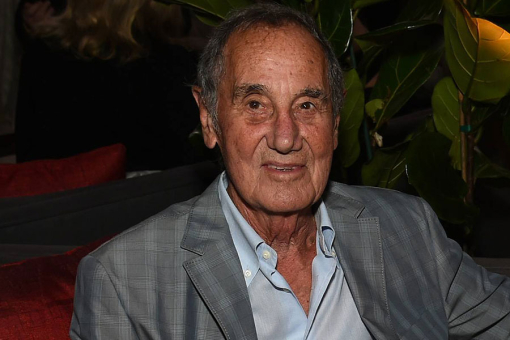In fall 1978, amid the sunny fare of Laverne & Shirley, Three’s Company and Happy Days, ABC premiered Taxi, a situation comedy cut from altogether different cloth.
It paired a grim setting with a cast of frustrated characters who all wanted to make it in their dream careers and quit driving cabs to pay the rent.
This year marks the 40th anniversary of the series, whose creators came from the ranks of The Mary Tyler Moore Show: James L. Brooks, Stan Daniels, David Davis and Ed. Weinberger.
After writing and producing shows for MTM Enterprises (also including Rhoda and Phyllis), they wanted to start their own shop, and Taxi was the first series from their John Charles Walters Company. In its five seasons on the air — 1978 to 1983 — Taxi won 18 Emmys, including three for Outstanding Comedy Series.
Taxi was a world of antic comedy dominated by abusive and amoral dispatcher Louie De Palma, a king troublemaker played by Danny DeVito. Louie lorded over the drivers at the Sunshine Cab Company. The only “professional” hack was Alex Reiger, portrayed by Judd Hirsch, the show’s “voice of reason.”
The other main characters were Bobby Wheeler (Jeff Conaway), a struggling actor; Tony Banta (Tony Danza), a naïve and bum boxer; Elaine Nardo (Marilu Henner), a financially strapped single mother and part-time art gallery receptionist; Reverend Jim Ignatowski (Christopher Lloyd), an aging hippie whose druggie lifestyle had seemingly seared his brain cells; and chief mechanic Latka Gravas (Andy Kaufman), a character adapted from Kaufman’s “Foreign Man” stand-up act.
In the second season, Carol Kane joined as Simka, whom Latka would wed. A native of Latka’s fictional country, she spoke the same wacky made-up language.
Based on the creators’ past successes, ABC committed to the show without seeing a script. Indeed, the series was famed for its outstanding writing (Michael Leeson and Ken Estin each took an Emmy during the run). Every episode was worked and reworked all week, sometimes right through to Friday night, when the show was taped before a live audience.
James Burrows, who also came from MTM, directed the first three seasons before leaving to work on Cheers, which he created with Taxi’s head writers, brothers Glen and Les Charles. A ratings smash the first season, Taxi saw its audience decline in subsequent years; after the fourth season, ABC canceled it. NBC — run by MTM cofounder Grant Tinker — picked up the show for what would be its final season.
Emmy contributor Jane Wollman Rusoff recently talked with Taxi’s cast and crew. All reminiscences reflect their exhilarating experience working on the unique sitcom. (Jeff Conaway, Stan Daniels and Andy Kaufman died in 2011, 2007 and 1984, respectively).
THE ACTORS
JAMES L. BROOKS: Christopher Lloyd would be Chris on Monday; and somewhere around Thursday, from not shaving, maybe from not bathing, he’d show up — and there was Reverend Jim.
JUDD HIRSCH: My agent called and said they’re doing this thing about taxi drivers. I said, “Oh, Jesus, it’s got to be the dullest thing in the world.” I said, “Make them an offer they can’t accept — and then I’m out.” But they accepted. When I saw my name above the title, I was shocked and embarrassed. I thought, “Oh, crap, no one [else in the cast] is going to talk to me.”
Marilu and I dated pretty early on in the show. It was as serious as you can get with somebody in a situation comedy. Everybody knew. They were all wagging their fingers. But you don’t acknowledge it — you just do it.
TONY DANZA: I was a boxer, had a screen test for a TV pilot that went nowhere, and I went back to fighting. Then I got an agent, who sent me to an open call for the movie The Warriors, which I got. When I went to wardrobe at Paramount, the casting lady for Taxi said she wanted to audition me for Taxi. They liked what I did, so I had to choose between a major motion picture and a TV series. I ended up with Taxi.
My first girlfriend in Hollywood was Marilu Henner. We’re still dear friends.
Jeff Conaway was the kind of guy you could call at two in the morning, and he’d be right there. He was a terrific actor, but he was so troubled. He had too many demons. If he had one drink or one puff of a marijuana joint, it would change his personality and he’d get self-destructive. I was with him when he passed away. Marilu and I and his sister sat vigil for a couple of weeks.
MARILU HENNER: I had romances offstage with Judd and with Tony. Jeff was more like a brother to me than anything else. He was like a big puppy dog. You always felt like you had to take care of him a little.
BARRY KEMP (writer): The introduction of Louie got an enormous laugh, because your first picture of him is sitting up above everybody in the cage. When he came down the steps, it was a huge surprise to the audience to see his height. At the table readings, Danny would read full-out. On show night, he would raise it another notch. It was the most amazing thing to watch.
JOEL THURM (casting): On the last day of the final auditions for Bobby, Jim Brooks brought in Cleavon Little. I should have said, “We should go with Cleavon.” But I didn’t. Not to take anything away from Jeff’s performance, but I think it would have been a more honest show had we gone with [Cleavon].
KATHERINE GREEN (writer): Marilu always wanted a little bit more to do. Every now and then she’d come into the writers’ room. She thought that, because I was a female writer, I could get her more stuff. But it was like, “It ain’t my show. I’m like you. I have to do what I’m told.” I felt bad.
THE CHARACTERS
HIRSCH: The idea was that I was the guy who could solve all the problems. Louie was the guy who made all the problems.
DAVID DAVIS: We were sitting on the couch in Ed. Weinberger’s office, and all of a sudden in marches Danny DeVito. That was the first laugh. He sat on the stool with the script rolled up and said, “Who wrote this shit? Where do you want me to start?” We said, “Page one.” And he started reading out cab numbers in that booming voice. That was it. We had our Louie.
DANNY DeVITO: It was a very physical part. I’d fall up those steps; I’d fall down those steps. Thank God, that cab was always there to lean on if I tripped going down the steps. But I really hurt myself a lot. There was always a bruise somewhere.
CHRISTOPHER LLOYD: Before I went in to meet everybody, I gathered costume pieces: a jacket with a peace sign on it, an old pair of Levi’s and my ex-father-in-law’s worn-through sneakers. “When you come back Monday,” they said, “wear that.” I heard rumors that there was some disapproval of Reverend Jim because of his penchant for drugs. I think some people felt he wasn’t an appropriate role model.
KEN ESTIN (showrunner-writer): Elaine was one of a couple of characters to remind us that we were in the real world. All the guys found her attractive, but at the same time, she was tough. You believed she could handle herself with drunk New York taxi fares.
Without Judd Hirsch, the show would have been just jokey people strung together. We looked to him for the substantial jokes, the grounding. Tony could play stupid without our feeling sorry for him, because he’s good-looking, charming and happy. You have to be sure that kind of character isn’t pathetic and stupid, because then you’re not going to laugh at them.
GLEN CHARLES: Louie wasn’t afraid of offending anybody. You could tell he had a chip on his shoulder because of his stature and could get away with anything.
RHEA PERLMAN (played Zena Sherman): When they asked me to do the part, I was so excited — also a little intimidated, because I didn’t want to let anyone down, least of all Danny! [Perlman and DeVito married in 1982 and separated in 2017.]
CAROL KANE: When Andy taught me [Latka’s] language, he said, “It’s just like when you’re a little kid, and you open your mouth and speak Russian or Chinese” — just having the confidence of a kid and proceeding. It was very freeing. But there was a very, very specific rhythm and music to it.
HENNER: At her core, Elaine had a motherly instinct, yet there was a spice to her. It was almost like Alex and I were the parents of the group, and then there were the kids — Tony and Bobby — and the crazy relatives, Latka and Simka.
RANDALL CARVER (played John Burns – Season 1): My character was a fish out of water – the only one who wasn’t a New Yorker. About three weeks into rehearsals, they were having trouble developing him. I knew I was on thin ice; so I did what they told me and kept my mouth shut. In March 1979, Ed. Weinberger called me into his office and said they had problems developing my character, but that I had made chicken salad out of chicken crap. So they had John Burns crash Cab 804 – their favorite cab. And that’s the last you ever saw of me.
BROOKS: John Burns was intended to be a major character. But at some point, there were just too many mouths to feed.
ANDY KAUFMAN
BROOKS: If you gave a note to Andy, he would act like he was Latka and be startled, but he’d follow it precisely. Andy was amazing. Somewhere in there, he was giving birth to performance art.
DANZA: Andy came in only on Tuesday and Friday. Another guy played him all week. Andy was a fearless genius. I happened to be a patient in the same hospital when he was there [dying]. So, I went to see him. He was very sick. That guy lived on seaweed and died of cancer. How do you figure that?
KANE: Andy felt that rehearsing too much would weaken his work. On shoot day, he and I would always have this talk in my dressing room. I would say, “Gosh, I feel bad, because I really wish I could rehearse with you.” He would say, “I don’t want you to feel bad, but I really can’t rehearse with you.” We had our little marital squabble — and then we went on, united.
MICHAEL LESSAC (director): Taxi was the first show I had ever directed. It was a huge challenge directing Andy, because he really didn’t show up till the end of the week because he wanted to be spontaneous. So, for me, it was a pain in the ass. I hated that. It seemed crazy and insane.
DeVITO: In the famous Tony Clifton episode [“A Full House for Christmas”], Andy was supposed to be “Tony” [a lounge singer he did in his stage act], but we were told we couldn’t let on we knew it was Andy. As it turned out, in rehearsals Tony Clifton was difficult. He wasn’t that good an actor. So, they decided to let Tony go. When they fired him, they had to call security to escort him off the lot.
HENNER: We thought, this guy is so bad that he’s going to take down Taxi. So, on Wednesday, there was another actor there, Richard Foronjy, to play the part.
WEINBERGER: [Andy] was great to work with. The only issue was his alter ego, Tony Clifton. The contract stated that I was forbidden to say that Andy was Tony. And that got me into all kinds of perplexities, because I ended up having to deny that I knew they were the same person.
WRITING
ESTIN: Jim Brooks was very autonomous and didn’t really care much about the notes from the studio. Sometimes we’d change lines right on the stage in front of the audience. Sometimes we didn’t even write them down. We just told [the actors] the new lines.
LES CHARLES: We wrote the episode that Ruth Gordon was in [as Dee], “Sugar Mama.” She was great to work with. But she had one complaint: When we did a rewrite, she said, “What was wrong with the first one?”
KANE: The thing that was very unusual was that the writers didn’t necessarily feel they had to end every episode on a happy note. Like, if Alex’s dog died, he didn’t end up getting a fabulous new puppy.
DIRECTING
ESTIN: Jim Burrows was very fastidious and careful about what he shot. If it wasn’t exactly right, after the audience left, he’d go back and reshoot.
BURROWS: I used four cameras, because the set and cast were gigantic. I always try, in rehearsal, to get everybody on the same page and have affinity for one another that will come across onscreen. But it was really difficult, because the Taxi characters were very alien to one another. Eventually, it happened.
LESSAC: I think it was the editor who told me, “Keep a camera on Judd, because we use him for editing. His expressions always give us a way to go.” Judd was always so completely present that, if you made a mistake, he was somebody to cover it.
MEMORABLE MOMENTS
BURROWS: The classic moment of Taxi for me was the episode when Reverend Jim gets his driver’s license [“Reverend Jim: A Space Odyssey”]. The moment that’s going to go down in history is when he did that line, “What does a yellow light mean?” and Bobby says, “Slow down.”
LES CHARLES: Glen and I wrote the script, and that joke was in the first draft. Once they were onstage, I think it was Jimmy Burrows who came up with the idea to repeat it more than once. It seemed to get bigger laughs as it was repeated, and Reverend Jim keeps speaking slower and slower. So, that joke wasn’t added on the stage; it was amplified on the stage.
KANE: There was a great episode, “Scenskees from a Marriage,” where Latka and a female taxi driver get stranded in a snowstorm, and he comes to her rescue. They’re going to freeze to death unless they have bodily contact. So, to save their lives, they sleep together. Latka and Simka’s religion [dictated] that, because of that, I had to sleep with one of Latka’s coworkers.
We decided that the last person to enter the apartment would be the one. It turned out to be Alex. I go to his apartment and offer myself to him, but he won’t take me. I say to him: “Peel me like a grape so I can get out of here.”
ESTIN: In “Thy Boss’ Wife,” Eileen Brennan played Louie’s boss’s wife. She cheats with Louie, who wanted to get even with his boss. For the bedroom scene, offstage Danny took a run, jumped on one of those little trampoline-like springboards and actually leaped to the set onto the bed.
LESSAC: In writing “Louie Goes Too Far,” Jim Brooks asked Danny to tell him the most embarrassing thing that ever happened to him. He said it was that he’d had to buy husky-size clothes in the children’s department. So, the episode where Louie talks about doing that was based on reality. Taxi always found the point of exquisite vulnerability, while at the same time most of the characters were being hilarious assholes. That’s what made the show great.
STANDARDS AND PRACTICES
BROOKS: [Standards and Practices] were a continual irritant. It was like living at the ocean and hearing the waves. But we said “son of a bitch” on our first show!
ESTIN: The strangest note I ever got from censors was: “You can’t say goat droppings,” but it was okay to say “goat pellets.” They said “Goat droppings sound gooey, wet and messy, but pellets are dry and clean.” I thought, “Are you kidding me?”
DeVITO: I had a scene with Rhea where she tells me she really doesn’t know why she’s going out with me. I say, “Well, why are you?” She says, “You touch me.” And I say, “Holy crap!” Standards and Practices said we were allowed to say “holy” and we were allowed to say “crap,” but we couldn’t say “holy crap.” This was a big note that came down from ABC. Of course, we appealed it, and they caved. “Holy crap” — that was our big victory!
TWICE CANCELED
BROOKS: When ABC canceled us, we had just won the Emmy for [Outstanding Comedy Series] two years in a row. They called on Thursday. I shouted into the phone: “Shame on you!” The whole cast started coming into my office, and we went on a major drunk together. Somewhere in the drunkenness, I called Grant Tinker. He said, “I can’t help.” I said, “That’s not why I’m calling you.” But then he took us on at NBC for a year.
HENNER: We started the ABC wake in Jim’s office and moved to Tony Danza’s house, and it went all night. We were devastated, because we didn’t have a final show to say goodbye in some way. A week later, Danny hosted Saturday Night Live, and we all flew to New York to take our final bow. In his monologue, Danny blew up [a computer graphic of] the ABC building. When NBC picked us up, I did a promo that said: “Same time, better station.”
LLOYD: After ABC canceled the show, HBO wanted us to do 12 one-hour episodes for a full season, and there was going to be more liberal censorship. But then NBC topped that offer with 22 episodes, which gave us the required number for syndication.
DeVITO: When NBC picked us up, [coproducer] Paramount was all happy, because they had another 22 shows. But we all knew that it was ending. It was kind of nice that we got a whole season to say goodbye to each other.
This article originally appeared in emmy magazine, Issue No. 7, 2018

